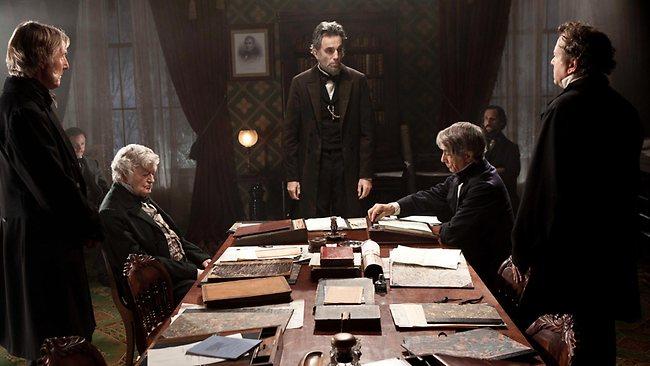
EIGHT months after the assassination of Abraham Lincoln in April 1865, the martyred US president's former law partner William Herndon began a series of lectures in which he promised to reveal "the real Lincoln".
Few people knew Lincoln better than Herndon. Not only had they worked together in Springfield, Illinois, but, with a future biography in mind, Herndon had spent months talking to people who had known Lincoln.
He wanted everyone to know Lincoln "just as he lived, breathed, ate and laughed".
The key to understanding Lincoln is recognising that he was not born great. Nor was his greatness a product of luck, superhuman powers or divine intervention. Lincoln's greatness, above all, derived from mastering the art of politics.
Lincoln was "exceedingly ambitious" with a "greed for office", Herndon argued. But what drove his political ambition was an intuitive understanding of what was "true and good".
This week, Steven Spielberg's big-screen adaptation of Lincoln's life, starring Daniel Day-Lewis, was released in Australia. Lincoln focuses on the final months of the president's life and his determination to secure the congressional votes needed to pass the 13th amendment to the constitution, abolishing slavery.
Day-Lewis's portrayal of Lincoln is astonishing. Thanks to contemporary accounts by Herndon and others, such as his private secretaries John Nicolay and John Hay, historians have a good understanding of how Lincoln talked, walked and acted.
In a performance that is full of heart, Day-Lewis captures the essence of Lincoln better than any other actor. He brings to life the famous portraits by photographers such as Mathew Brady, Alexander Hesler and Alexander Gardner.
Spielberg's cinematic masterpiece is timely, given the paucity of political leadership in most democratic countries, including here in Australia.
The film shows Lincoln navigating the political process to secure support to abolish slavery, which was critical to ending the Civil War, which had raged since the early days of his presidency.
He does whatever it takes, from appealing to a congressman's nobler instincts in one scene to blatantly buying off another with patronage in another.
It is a masterful display of tactics and strategy in support of a cause fundamental to human freedom as Lincoln struggles to find a balance between compromise and conviction, which is the currency of politics.
"A compass," Lincoln says in the film, "it'll point you true north from where you're standing, but it's got no advice about the swamps and deserts and chasms that you'll encounter along the way. If in pursuit of your destination you plunge ahead, heedless of obstacles, and achieve nothing more than to sink in a swamp, what's the use of knowing true north?"
Lincoln's political skills were not limited to congressional negotiations. He was the complete political package, even though critics can point to contradictions in some of his actions and statements, especially as his views evolved on slavery.
Although one of the least experienced men to be elected president - he had served a single term in congress - Lincoln was exceptionally intelligent and a quick learner. He understood the possibilities and the limitations of the presidency and he harnessed the powers of the office to further his goals.
As commander-in-chief, he often had a better understanding of the elements of a successful military strategy than his top generals.
A good judge of people, he was adept at party politics and cleverly managed the rivalries within his cabinet. He also could be charitable towards his opponents.
Lincoln was not afraid to admit mistakes or to change his mind. He was usually unflappable when faced with a rebuff from congress or criticism in the press, or when absorbing the impact of a defeat meted out to the Union army. His speeches and statements were typically crafted with precise language, logic and brevity. He often used a slow-building rhythm, rhetorical devices and lyrical flourishes that amplified the crux of his arguments.
He understood that politics and leadership are often about persuasion. In person, he was known for his ribald joke-telling, tall tales and self-deprecating humour. This was just part of how he connected with people.
Russian novelist Leo Tolstoy spoke of "the greatness of his character" and the "moral power" that Lincoln possessed. "Alexander," he argued, "Frederick the Great, Caesar, Napoleon, Gladstone and even Washington" ranked far behind Lincoln in stature.
Lincoln's success was based on something that often can't be learned, though it is easily observed: judgment. He understood human nature. He knew how to appeal to people, to motivate them and to respect them. Critically, he knew how to use politics to turn his country in a new direction.
Lincoln was elected and re-elected president. He won a civil war and preserved the union of states. He re-birthed America's historic purpose and ensured that it lived up to its noble promise of life, liberty and the pursuit of happiness.
Herndon's lectures about "the real Lincoln" were a sensation. But his long-awaited biography languished for two decades. It was not until he accepted the help of a young writer, Jesse Weik, that the three-volume work was published, in mid-1889.
Although not without flaws, Herndon's insights provided the scaffolding on which all others have tried to understand one of humanity's greatest political leaders. In the latest cinematic rendering of this life, Spielberg and Day-Lewis bring us even closer to understanding that the political genius of Lincoln was fundamental to his rise to greatness.


